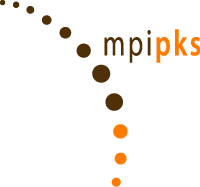
Fluid Physics of Life
Workshop Report
Fluid flow-based transport of cargo (dissolved substances, like oxygen, signaling molecules, and waste products, particulates, etc.) is a ubiquitous and essential process in life. Once the length scales exceed a few microns, the time scales for diffusive transport for just about anything become prohibitively long. Yet, flow not only beats the diffusion barrier, but it also allows for directed transport and timed delivery of cargo. Without fluid flow, life as we know it, would not exist.
Fluid flow is a key player for the function and behavior of biological systems. The dynamics of blood flow, microbiota, cerebral fluid, but also cytoplasmic streaming, flows in algae and bacterial colonies, and in cells, are challenging problems since fluid flows are inherently coupled over many spatial and temporal scales, and the fluids themselves have suspended particulates (possibly active), are viscoelastic, couple strongly to the walls, or take place in geometrically complex spaces. In biological systems, dynamics of fluid flow can be very complex as flows impact morphology, biological signaling, and also dynamics of development. Yet, except for a few very promising glimpses on the role of flows, often our knowledge is limited to the fact that fluid flows are important, but fundamental insights into the principles of how flows interact with living systems are missing.
The workshop was situated at a moment in time when tremendous advances in imaging as by light sheet microscopy, fluorescent nano-tubes and real-time MRI, but also in biology by opto-genetics are emerging. These technical advances in physics and biology open up entirely new possibilities for the development of a theoretical understanding of the complexity of the flows to be understood, from nanoscales to large scales. The workshop aimed and succeeded at forging a new research field by bringing together theoretical physicists (R. Golestanian, F. Jülicher, D. Kelley, M. Wilczek), applied mathematicians (J. Dunkel, M. Roper, M. Shelley), experimental physicists (K. Drescher, R. Goldstein, K. Jensen, M. Kreysing, M. Sano, A. Zidovska), as well as biologists (R. Faubel, N. Jurisch-Yaksi) and physiologists (A. Siekmann). This has fostered intense discussions of the fundamental principles of how flows govern living systems.
The small size of the workshop, with about 60 participants, has allowed a vivid exchange of ideas, particularly between young and experienced scientists. This exchange of ideas, but also mentoring, was furthers fueled by very lively poster sessions as well as the three-hour timeslots for discussions in the afternoon each day.
Taken together, the workshop succeeded at its ambition to forge a new research field as recognized by all participants – to the delight of the participants and the organizers.
